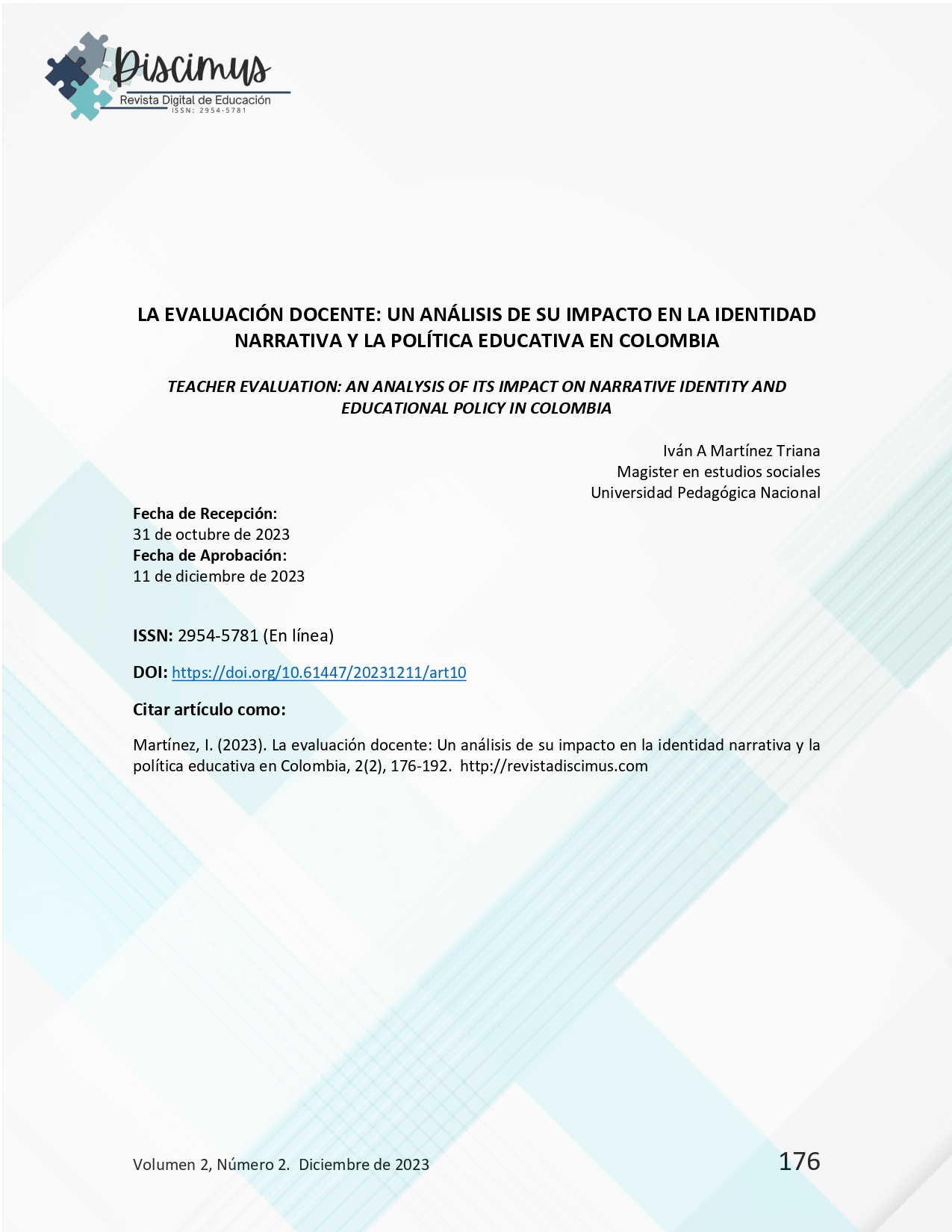Teacher evaluation: an analysis of its impact on narrative identity and educational policy in Colombia
DOI:
https://doi.org/10.61447/20231211/art10Keywords:
Teacher Assessment, Teaching Performance, Educational Policy, Narrative IdentityAbstract
Abstract
This document provides an in-depth examination of teacher assessment within the Colombian context, exploring its influence on teachers' narrative identity and its relationship with educational policy. The text begins by highlighting the significance of teacher assessment in contemporary education and how this practice has become a crucial element in decision-making regarding educators' performance.
The analysis focuses on the interplay between teacher assessment, teachers' narrative identity, and educational policies in Colombia. It argues that teacher assessment has largely adopted an economic perspective, leading to the standardization of teaching performance and a narrow view of teachers as mere task executors, at the expense of their role as intellectuals and cultural workers.
The text underscores the importance of teacher self-assessment as a means to empower teachers to examine their own performance without fear of punitive measures, fostering a dialogue and a democratic relationship with educational policy. It asserts that teacher assessment should not solely be seen as a deficit-based control tool but rather as a means to improve and transform pedagogical practices, tailored to the specific needs and contexts of the diverse Colombian educational landscape.
Ultimately, it suggests that the construction of a collective narrative identity among the teaching faculty and the promotion of democratic dialogue among educational stakeholders are pivotal steps to influence educational policy and ensure that teacher assessment reflects the reality of the teaching and learning processes in Colombia.
Downloads
References
Arfuch, L. (2010). Sujetos y Narrativas. Narratives and subjects. Acta Sociológica, 53, 19–41.
Bruner, J. (1996). Realidad mental y mundo posibles (Tercera). Gedesa, S.A.
Calderón Palacio, I. C. (2018). La Práctica Pedagógica Atrapada en un Lente: Análisis de la Evaluación de desempeño docente. In Práctica Pedagógica y Formación de Maestros (Primera Edición, pp. 33–41).
Corona, C. N., & Montoya, M. S. R. (2018). Mapeo sistemático de la literatura sobre evaluación docente (2013-2017). Educação e Pesquisa, 44(0). https://doi.org/10.1590/s1678-4634201844185677
Decreto 1278, Por el cual se expide el Estatuto de Profesionalización Docente (2002).
Decreto 2277, Por el cual se adoptan normas sobre el ejercicio de la profesión docente (1979).
Decreto 3783, “Por el cual se reglamenta la evaluación anual de desempeño de los servidores públicos docentes, directivos docentes que se rigen por el Decreto 1278 de 2002” (2007).
Foucault, Michel. (1979). Microfísica del poder (Segunda edición).
Klein, I. (2008). I. El relato del yo o la reinvención de sí mismo. In La Ficción de la Memoria (pp. 15–38). Prometeo Libros.
Kushner, Saville. (2010). Prólogo: Recuperar lo Personal. In Voz y educación La narrativa como enfoque de interpretación de la realidad (Primera, pp. 9–16). Octaedro.
Lejeune, P. (1991). El pacto autobiográfico. Suplementos Anthropos, 29(9), 47–61.
Ley 115. Ley General de Educación, El Congreso de la República. (1994).
Ley 715, Por la cual se dictan normas orgánicas en materia de recursos y competencias de conformidad con los artículos 151, 288, 356 y 357 (Acto Legislativo 01 de 2001) de la Constitución Política (2001).
Ministerio de Educación Nacional. (2003). Manual de la Evaluación de Desempeño.
Ministerio de Educación Nacional. (2008). Guía Metodológica: Evaluación Anual de Desempeño Laboral. www.mineducacion.gov.co
Ministerio de Educación Nacional. (2010). Directiva Ministerial No 26. In Evaluación anual de docentes y directivos docentes. Ministerio de Educación Nacional.
Resolución No. 15711, Por la cual se establece el cronograma de actividades para el proceso de evaluación de carácter diagnóstico formativa de los educadores oficiales regidos por el Decreto Ley 1278 de 2002, que no han logrado ascenso de grado o reubicación de nivel salarial (2015).
Ricoeur, P. (2006). La vida: Un Relato en Busca de Narrador. Ágora-Papeles de Filosfía, 25(2), 9–22.
Rivas, J. I., & Herrera, D. (2010). Voz y educación La narrativa como enfoque de interpretación de la realidad (1st ed.). Octaedro.
Rivilla, M., Garrido, D., Concepción, M., & Domínguez, M. (2010). Evaluación de las competencias docentes. http://www.redalyc.org/articulo.oa?id=179420770002
Rueda Beltrán, M. (2009). La evaluación del desempeño docente: consideraciones desde el enfoque por competencias. Revista Electrónica de Investigación Educativa, 11(2), 1–16. http://www.redalyc.org/articulo.oa?id=15512151004
UNESCO, UNICEF, Banco Mundial, UNFPA, PNUD, ONU Mujeres, & ACNUR. (2016). Declaración de Incheon y Marco de Acción ODS 4-Educación 2030.

Downloads
Published
Issue
Section
License
Copyright (c) 2024 Ivan Alirio Martinez Triana (Autor/a)

This work is licensed under a Creative Commons Attribution-NonCommercial-ShareAlike 4.0 International License.
Open Access Policy at Discimus Journal
Discimus Journal is committed to the promotion of free circulation of scientific and academic knowledge, simultaneously ensuring appropriate acknowledgment for our authors while adhering to the ethical principles of scientific publishing. In alignment with this goal, Discimus publishes all its articles under the ATTRIBUTION-NONCOMMERCIAL-SHAREALIKE 4.0 INTERNATIONAL CC BY-NC-SA 4.0
What does this imply for authors, readers, and the scientific community?
1. Usage Freedom: Under the license CC BY-NC-SA 4.0, anyone is allowed to share (copy and redistribute the material in any medium or format) and adapt (remix, transform, and build upon the material) the articles published in Discimus, for any purpose, including commercially.
2. Attribution: Users must give appropriate credit, provide a link to the license, and indicate if changes were made to the original work. This credit must include the author's citation, the article title, the publication in Discimus, and, if feasible, the DOI of the article. This attribution should not in any way suggest that the authors or Discimus endorse the use made of the work.
3. Share Alik: If users remix, transform, or build upon the material, they must distribute their contributions under the identical license as the original.









